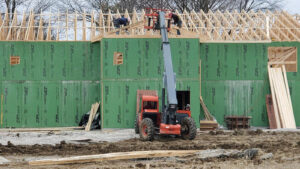Andrew Kopp works in the shadow of the new parking garage, and he’s still unhappy about the way the structure nearly doubled in size after initial public hearings and now blocks the sunlight much of the day.

“It towers over my windows as I look out my office,” Kopp, an attorney with Grimes, Fay & Kopp LLC, said during a CBT lunch forum on downtown parking. The firm is located directly across Fifth Street from the 10-level structure that will open next month.
City officials, architects and engineers all said the new parking garage would be “a maximum of six stories but more likely four,” Kopp said. When it reached City Council for a vote in fall 2008, “it was nine, 10 stories tall and was entirely different. That started us off, a lot of people from that area, on a bad note.”
Kopp came to Columbia in 2002 to attend law school at MU, and decided to settle here because “it’s a big city with a small-town feel.” But whenever he and his wife bring up the idea of going out for dinner at a downtown restaurant, “it’s always, ‘No, there’s no parking.’ … I’m from a small town; you park outside the place you’re going to, you walk 25 feet, and then you’re there. You’re not walking eight blocks, especially in the snow and bad weather.”
He doesn’t believe the new parking garage on the east end of downtown will help meet another goal expressed by city officials: making it easier for people to find a place to park when they want to eat, shop and be entertained downtown.
“I don’t see it happening with its location,” Kopp said, adding that it seems to be more useful for service industry and government employees. “I’m not going to park on the ninth story and walk down all nine floors and walk up three or four blocks to a restaurant on Ninth or 10th Street.”
During the forum at the Tiger Hotel on Jan. 13, Mayor Bob McDavid said he’s also not pleased by the magnitude of the new parking garage.
“I wasn’t here,” said McDavid, who was elected last April. “If I had been paying attention, and I wasn’t, I would have advocated for a smaller parking garage.” He said he also would have opposed the original plan for renting ground-floor space because “I don’t think the city should be in the commercial real estate business. But what’s done is done.”
McDavid said he’s more concerned about future parking issues: foremost is the high cost of paying off the bonds used to finance the new parking garage, which will make it difficult to build another garage on Short Street on the east end of downtown that might be needed.
McDavid said he understands that parking garages in a city the size of Columbia always need to be subsidized because drivers would be unwilling to pay more than about $60 a month for garage parking, and the city would have to charge more than $100 a month for each space to break even.
“We do need a vibrant downtown area,” he said, adding that he believes it’s right for the government to subsidize the construction of parking garages “for the good of the city.”
The mayor originally scrutinized the city’s parking system while looking for ways to bolster the revenue-depleted city budget. He asked City Council to look into transferring a portion of the parking utility’s revenue to the general fund.
McDavid learned that the parking utility’s surplus was depleted by the payments on the $13 million worth of bonds purchased by the city to finance the new parking garage.
Revenue from parking meters and permits goes to the parking utility, an independent business unit within the city, while revenue from parking tickets goes into the general fund. Now, McDavid and other Council members are considering whether to increase parking ticket fines from $5 to $10 to increase general fund revenue.

“We don’t have that buffer of the profit that we once did because of our Fifth Street garage,” McDavid said. “With the Short Street garage, we’re going to have to nail this down a little tighter.”
McDavid began his comments by saying, “I guess I look at it differently than the city manager, and he may be right; I don’t know.”
At the conclusion of the mayor’s remarks, Watkins said he agreed that providing sufficient parking is necessary for a vibrant downtown and supported by the vast majority of residents, as expressed through the visioning process.
“I’m not going to disagree that the parking garage is going to lose a bunch of money,” Watkins added. “And again, I’m not going to disagree that the structure is taller than most of us would like.”
The city manager then cited an extensive parking study in 2001 that said downtown would need nearly 1,000 more parking spaces north of Broadway and recommended the construction of garage parking rather than the expansion of surface lots.
Watkins said one-half to three-quarters of the space in the new parking tower will be filled with city employees’ vehicles and city-owned service vehicles, such as police cruisers and Water & Light service trucks. Some employees from the county and the Postal Service also will be using the new space. The shift of city employee parking will open up space in central garages and surface lots for shoppers and other visitors.
“The goal is to put service employees in the tower and free up space on the street,” Watkins said, and on the first two levels of central parking garages.

Council member Gary Kespohl said, “The new garage has a good chance of being mostly occupied or fully occupied. … The downtown is growing and vibrant, and we have to have adequate parking for people to shop and work and play downtown and we’re on a course to do that.”
Watkins also pointed out that it’s more cost-effective to build taller parking structures. “The cheaper spaces are always the higher ones; the eighth level is cheaper to build than the third level.”
As for the ground-floor space, he said, “We could rent that space today, but we saw a lot of pushback from members of private sector.”
The space instead will be used by Regional Economic Development Inc., which is seeking funding to house a small business incubator next to its offices.









